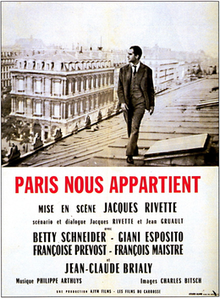Paris nous appartient: a fable for our time

Last weekend I saw, for the first time, Jacques Rivette's debut feature film Paris Nous Appartient (1961). It made quite an impression on me, and not just for its aesthetic qualities. I'm about to spoil the plot for my own purposes here, so if you're planning on ever seeing it you may be better off not reading this piece. On the other hand, it may not make any great difference: although it takes the form of a thriller, its power has more to do with atmosphere than suspense.
Set largely in the chambres des bonnes, hotel rooms and dingy studio apartments of postwar Parisian bohemia, Paris Nous Appartient concerns a milieu of artists and intellectuals who are haunted by the possible existence of a global, omnipresent but unspecified conspiracy which may be responsible for the death of one of their members, a young anti-Francoist Spanish composer, and the disappearance of his sister. The conspiracy is evoked in terms which refer both to fascism and the apocalypse: there are prophecies of more deaths to come, focussed in particular on a young theatre director who is mounting a production of Shakespeare’s Pericles. When the director is found dead, apparently by his own hand (like the composer), the existence of the conspiracy seems to be confirmed.
The nature of the conspiracy is quite unclear- is it a metaphor, and if so for what (capitalism, fascism, nuclear armageddon....)? Or is it simply a plot device, a McGuffin- and if so, what role is it playing? Does it even exist? What in the end is this film about? The viewer, if they are at all familiar with French arthouse cinema, is resigned to never knowing the answers to any of these questions. But then, in a rapid dénouement, everything seems to fall into place.
It turns out there was a conspiracy: in fact there were two. The young composer was indeed murdered, by agents of the Franco government. His sister has disappeared because she has returned to Spain to continue the anti-Franco struggle. The young director was the victim of an unconnected conspiracy, a nasty theatre-world intrigue in which one of the backers of his production was seeking to have him ousted, driving him to suicide. But the impalpable, universal conspiracy was a McGuffin, one that the characters had created for themselves, both deriving from and obscuring the plotting that was actually going on in the real world.
Which brings me to Jean-Luc Mélenchon and the second round of the French presidential elections. It is expected that many of M. Mélenchon's voters in the first round will abstain on Sunday on the grounds that there is little to choose between Emmanuel Macron and Marine Le Pen. The slogan #SansMoiLe7Mai has become a rallying cry for these abstentionists of the left on social media. Mélenchon has refused to give his support to Macron, while saying he will not vote for Le Pen (that this actually needs to be said!) Historian Emmanuel Todd and overdemanding media tamegotchi Slavoj Zizek are among the intellectuals of the left supporting the abstentionist line.
The abstentionist left seem to me to be in exactly the same situation as the intellectuals in Paris Nous Appartient. Their nebulous, omnipresent McGuffin is called 'neoliberalism' or 'globalisation' or 'the elite'. Like the imagined conspiracy of the postwar bohemians, it claims to explain everything while in reality explaining nothing and obscuring a great deal. According to this utterly schematic narrative, to focus on the fact that a fascist candidate is placed to win 40% or more of the vote, with a non-neglible risk of winning outright, is to fail to see the big picture. In reality Le Pen and Macron occupy different positions on the same side.
The true (omnipresent, inescapable) enemy is (take your pick) neoliberalism/globalisation/the elite, of which Macron is the agent and Le Pen the possibly unwitting ally- or perhaps the other way round. Only the abstentionist faction offers any genuine resistance, blessed as it is with the ability to see the situation in all its ramifications and unmask the true complicities between superficially opposed candidates. It's a trick (a narrative trick, in fact) that's been pulled many times before.
In Paris Nous Appartient people make grave mistakes because they have sought to bring all the evil of the world within the compass of a single schema, a totalising plot (in both senses of the word), while in reality the villains, who were by no means imaginary, were pursuing separate conspiratorial projects completely independently of each other. Even with a real life fascist dictatorship in power in a neighbouring country, they weave a story of global conspiracy to explain their friend's death. They fall victim to their own McGuffin, and this in turn has fatal consequences.
Well we have real life fascists to contend with now, and they are within shouting distance of power. The universe has not become a totalising conspiracy where a debutant centrist and a dynastic fascist are just two sides of the same coin. If Paris Nous Appartient has a lesson to offer, it is that there is a time to stop telling stories, drop the McGuffins and allow reality to be as untidy and inconsistent as it in fact is. Macron/Le Pen is not a choice between two masks of the same evil. We are not at the movies.